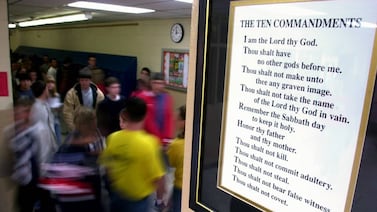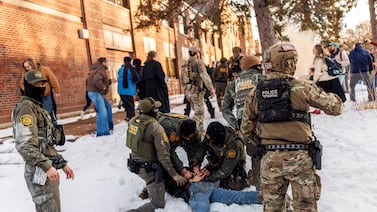Some students at Kensington Creative and Performing Arts High School did not log into school Monday in a protest over screen time.
For nearly a month, some students at the school have argued for less daily screen time, saying their remote-learning schedule is excessive and unhealthy. Students spend about six hours a day on screens, and many have homework afterward.
“The students are finally putting our foot down because every time we bring this up nothing happens and we are sick and tired of it,” Jayden Morales, a 10th grader at the school, said. “Our mental health is not really there.”
Students involved in Monday’s “logout” estimated 50 students didn’t attend virtual classes, out of more than 500 at the school. Students told Chalkbeat they think that number could grow if school administrators don’t address their concerns. Principal Patricia M. McDermott-Fair has not responded to requests for comment.
“The logout that took place was to grab people’s attention,” said Dena Stiles-Lawson, a 10th grader at KCAPA. “So what we are going to do now is if you don’t fix the problem then who is to say that we will keep logging in and subjecting ourselves to this schedule?”
The students’ proposed schedule would start at 9 a.m. and end at 2:25 p.m., with a longer lunch and homeroom and five-minute breaks between each class. They would like no screens on Fridays. Right now, students attend class between 8 a.m. and 3:04 p.m., nearly six hours a day, even with small breaks and lunch.
Samantha Ayala, a senior, said she believes the school could look at other high schools’ schedules for comparison. “There are other schools starting later in the day and work closer with their students,” she said.
Royal Hues, a 10th grader at KCAPA, echoed the sentiments of her classmates. “This logout was important because it speaks up for those who are scared to speak up. This logout states that we are a team and we can work together and we can get this schedule changed. We’re speaking up for the unheard.”
During his last press briefing, school Superintendent William Hite said the district provided guidance for school leaders on the structure of a virtual day. The district is currently collecting results from teacher and student surveys.
Hite said the district’s guidelines “took into account the screen time” for all grades. He said if students are concerned about screen time they should first talk to their teachers and then their school principal.
According to Chief of Academic Supports Malika Savoy-Brooks, the district implemented schedules and incorporated brain breaks when it had to transition to digital learning due to COVID-19
“In no way, do we expect students or staff to be engaged in on-screen activities for extended periods of time and we will continue to work with students, staff and school communities to see how we can best support them while we remain engaged in digital learning,” Savoy-Brooks said.
Education and medical experts say that too much screen time can cause poor sleeping habits, anxiety, and obesity.
“School makes situations for kids like me hard,” said Christian Dominguez, an 11th grader at KCAPA. “I’m also in foster care so I have to deal with court dates and therapy and deal with workers always on my back for little things that happen during the day.”
McDermott-Fair on Friday sent two separate letters to families and faculty that the school had “received communication” some students and staff might stage a “logout” protest on Monday.
“I understand that frustrations might be heightened because of the very unusual circumstances that we’re all living in these days,” McDermott-Fair wrote.
Students who didn’t log in to class on Monday received an unexcused absence. In the letter to Kensington CAPA staff, McDermott-Fair said she expected staff members to follow their schedule Monday.
Students at Kensington CAPA started an online petition almost a month ago to demand an alternate schedule, which would reduce class times to 50 minutes instead of 90 minutes. A growing number of teachers at KCAPA are supporting the students’ concerns.
Love Speech another KCAPA sophomore, stated other demands include creating a student council, and getting students help on issues at home, and more honors classes.
“We are putting on them to be live from 8 a.m to 3 p.m. and then be on their computers afterward with more work and continued practice with other assignments they need to complete,” said Ivan Juarez, who teaches ninth-grade Algebra at Kensington CAPA. “They express fatigue with being online for so long and not getting one-on-one communication with teachers.”
With their protest, the students wanted to show school leaders how serious they were about the screen time. They aren’t sure how long their protest will continue.
“We’re going to get this schedule changed and we are going to get through this,” said Audim Brokenbough, a 10th grader. “If we don’t, then we are still going down with a fight.”






